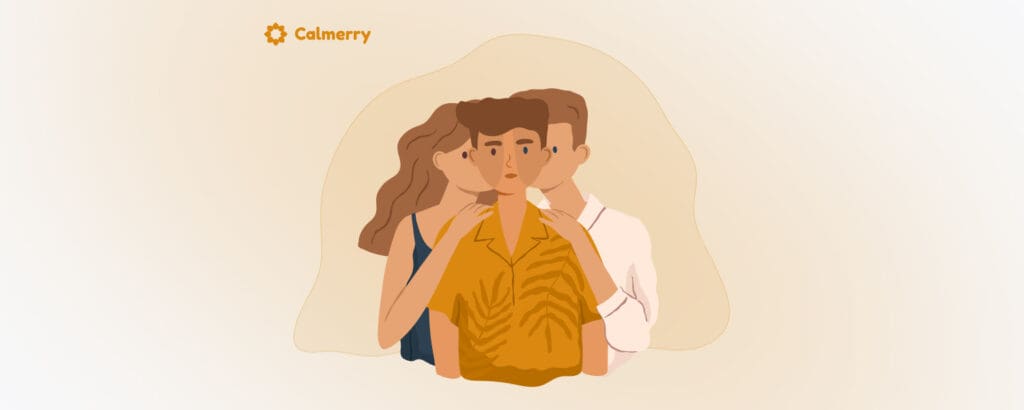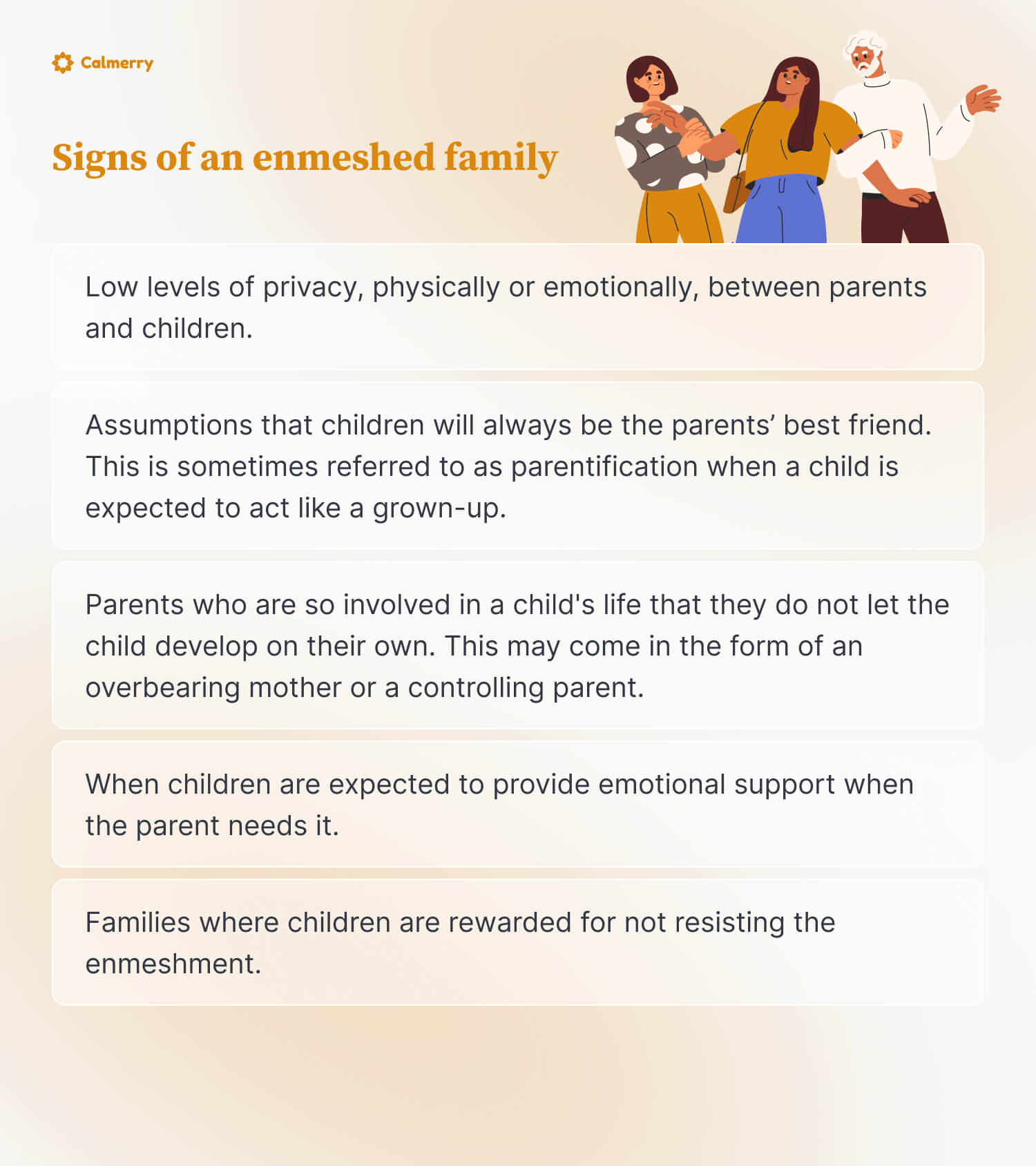What is Enmeshment Trauma? Learn the Symptoms, Effects, and How to Heal

In this article
Your family is usually the first place where you feel loved, accepted and begin to develop a sense of who you are. A close family can provide this and still maintain clearly defined boundaries and roles to help members develop as individuals within the larger family group.
Enmeshment trauma is based on an enmeshed family dynamic, where there is a lack of boundaries and the clear roles necessary for someone to develop a healthy sense of self and emotional stability.
Enmeshment trauma is not just negative experiences of growing up in a family that was “too close”. Knowing the difference and seeking support is the first step to healing.
What is enmeshment trauma?
Family enmeshment and enmeshment trauma is based on ideas developed by Salvator Minuchin in his work with families and family systems [1] Families and Family Therapy | Salvador Minuchin, Arlene Vetere | Taylo. (2020, October 12). Taylor & Francis. https://www.taylorfrancis.com/families-family-therapy-salvador-minuchin-arlene-vetere .
In an enmeshed family dynamic, there is a lack of boundaries, often both physical and emotional. And appropriate roles for family members are not clearly defined.
With enmeshed boundaries and clearly defined individual roles in a family, members struggle to identify who they are outside their family of origin. They often lack the skills to develop a healthy sense of self or relationships with others later in life.
Cultural considerations on enmeshment trauma
Roles and beliefs are different for families and individuals depending on the culture you are part of or where you were raised. This can change one’s understanding of, and experience with, enmeshment trauma.
The United States is a very individualistic culture, and what may look like enmeshment in the United States may not be in a culture that has a more collectivist society like Japan or Italy.
For example, one study found that “enmeshed” adults in the UK suffered from higher rates of depression than “enmeshed” adults in Italy due to differences in cultural expectations. [2] Cohesion and Enmeshment revisited: Differentiation, Identity, and Well-Being in two European Cultures on JSTOR. (n.d.). www.jstor.org. https://doi.org/10.2307/3838884
Cultural norms play a part in how enmeshment is defined, as well as possible outcomes.
Signs of an enmeshed family
Knowing the signs of an enmeshed family is part of being able to identify if you are experiencing enmeshment trauma.
Below are some examples of the signs of an enmeshed family:
- Low levels of privacy, physically or emotionally, between parents and children.
- Assumptions that children will always be the parents’ best friend. This is sometimes referred to as parentification when a child is expected to act like a grown-up.
- Parents who are so involved in a child’s life that they do not let the child develop on their own. This may come in the form of an overbearing mother or a controlling parent.
- When children are expected to provide emotional support when the parent needs it. This would be another example of parentification.
- Families where children are rewarded for not resisting the enmeshment.

Enmeshment trauma symptoms
It is important to keep in mind that everyone experiences trauma and the symptoms of it differently, including enmeshment trauma symptoms.
Below are some common enmeshment trauma symptoms to be aware of:
Trauma bonding
Those who experience enmeshment trauma may experience the symptom of a trauma bonding or a tendency to identify with the parents they have enmeshed boundaries with.
In an enmeshed parental relationship, parents might use verbal abuse or other methods to gain sway over the child. In the context of parental enmeshment and abusive methods of control, the person experiencing the enmeshment trauma unknowingly forms an emotional and psychological attachment with the parent they have an enmeshed, abusive relationship with.
Conflict avoidance
Another symptom of enmeshment trauma is someone who is conflict-avoidant.
For those growing up in an enmeshed family, it may not have been safe for them to disagree with their parents. Therefore, they expect that disagreeing with others will continue to be unsafe.
– Arabel Elliott, Master of Social Work (MSW)
As a result, those who suffer from enmeshment trauma often shy away from conflict in adult relationships, hoping to dodge any negative fallout in relationships.
Difficulty forming healthy relationships
For some people who experience enmeshment trauma, they may have the symptom of finding it difficult to form adult relationships, to begin with.
Enmeshment trauma might cause individuals to recreate an unhealthy codependency in relationships.
For example, after being raised by a parent who smothered them and was over-involved in their lives, people with these enmeshed boundaries might then seek to recreate them in their adult relationships.
Emotional dysregulation
Another way this symptom of difficulty with forming adult relationships might express itself for those experiencing enmeshment trauma is that they have difficulty managing their emotions. For example, regulating their anger.
This can negatively affect one’s ability to form relationships and succeed in multiple environments, including work, romantic relationships, and friendships.
Low self-esteem and lack of confidence
Low self-esteem is a frequent symptom of enmeshment trauma. In an enmeshed relationship with parents, a person’s ability to act and their sense of themselves is overly dependent on parental approval.
As an adult, someone suffering from the symptoms of parental enmeshment often lacks confidence in their ability to act on their own, know who they are, or be themselves based on a fear of rejection or judgment.
How to heal enmeshment trauma
The good news is no matter who you are on your path to emotional health and wellness, there are ways to heal from enmeshment trauma.
With the right support, professional help, and the strengths that each person possesses within themselves.
Learn what boundaries are and how to set them
It is an important first step in how to heal enmeshment trauma. It might seem scary at the start, but you can do it. For example:
- In an enmeshed relationship with parents, they might call 10 times a day, making you anxious or angry every time you answer the phone. You may need to talk with them and tell them to call less. You might stop answering the phone every time they call. If you are in an enmeshed relationship with your parents, this is likely to cause strain at first. Give it time, and eventually, you should feel lighter, less angry, and you can begin to heal from the enmeshed relationship.
- Do you have difficulty making any decisions in your own life without contacting a family member to get their input and opinion first? In the case of family enmeshment like this, it is important to set boundaries for yourself, trust your ability to know your own mind, and make those decisions. When you are able to build on your own successes and learn from your own mistakes, you learn more about yourself, what you are capable of. With a better sense of your own identity, you are more able to heal from the trauma of the family enmeshment.
Get to know yourself and your wants, outside family constraints
Enmeshment may feel safe if it is what you grew up with in your family. In enmeshed relationships, you don’t have to make decisions for yourself or operate based on your own needs or desires.
This may be familiar, but it means you lack a sense of who you are as an individual and what your own thoughts and feelings are separate from your family of origin.
– Arabel Elliott, Master of Social Work (MSW)
Some things you can do to heal from this are:
- Check in with yourself, take time regularly to ask yourself how you feel unrelated to others, and honor those feelings. What you feel is valid, and recognizing it is an important part of healing from enmeshment trauma.
- Ask yourself out for a meal or attend an event you might enjoy based on what you like and not someone else. It might feel awkward at first, but planning something you enjoy without the input or approval of others and taking that step to do it is a real way to build up your ability to act and think for yourself in a healthy and independent way.
- Explore your own thoughts and interests. Ask yourself questions about what you like, as if you are making a new friend. By respecting your own thoughts and feelings, you develop a stronger sense of your own identity and how to heal from enmeshment trauma.
Enmeshment therapy
It can be overwhelming dealing with the symptoms of enmeshment trauma and trying to heal from it at the same time. Calmerry provides adults 18 years and over an easy and supportive way to access online therapy and begin the process of healing using enmeshment therapy.
With the use of enmeshment therapy, you can safely examine how family enmeshment or parental enmeshment you experienced may have contributed to your own dysfunction or function later in life.
Online therapy is not only safe, but it can be as effective as in-person counseling, and it can be a more accessible and convenient way for you to connect with people qualified to help you explore your enmeshment trauma, set healthy boundaries, and develop a sense of your own identity.
Remember, this is not easy, so be patient with yourself. It took you a lifetime to get to this point, and healing from enmeshment trauma will take time.
– Arabel Elliott, Master of Social Work (MSW)
The good news is help is available. With support from Calmerry, you can connect to a therapist and begin to heal.
Families and Family Therapy | Salvador Minuchin, Arlene Vetere | Taylo. (2020, October 12). Taylor & Francis. https://www.taylorfrancis.com/families-family-therapy-salvador-minuchin-arlene-vetere
Cohesion and Enmeshment revisited: Differentiation, Identity, and Well-Being in two European Cultures on JSTOR. (n.d.). www.jstor.org. https://doi.org/10.2307/3838884
online therapy
live video session


